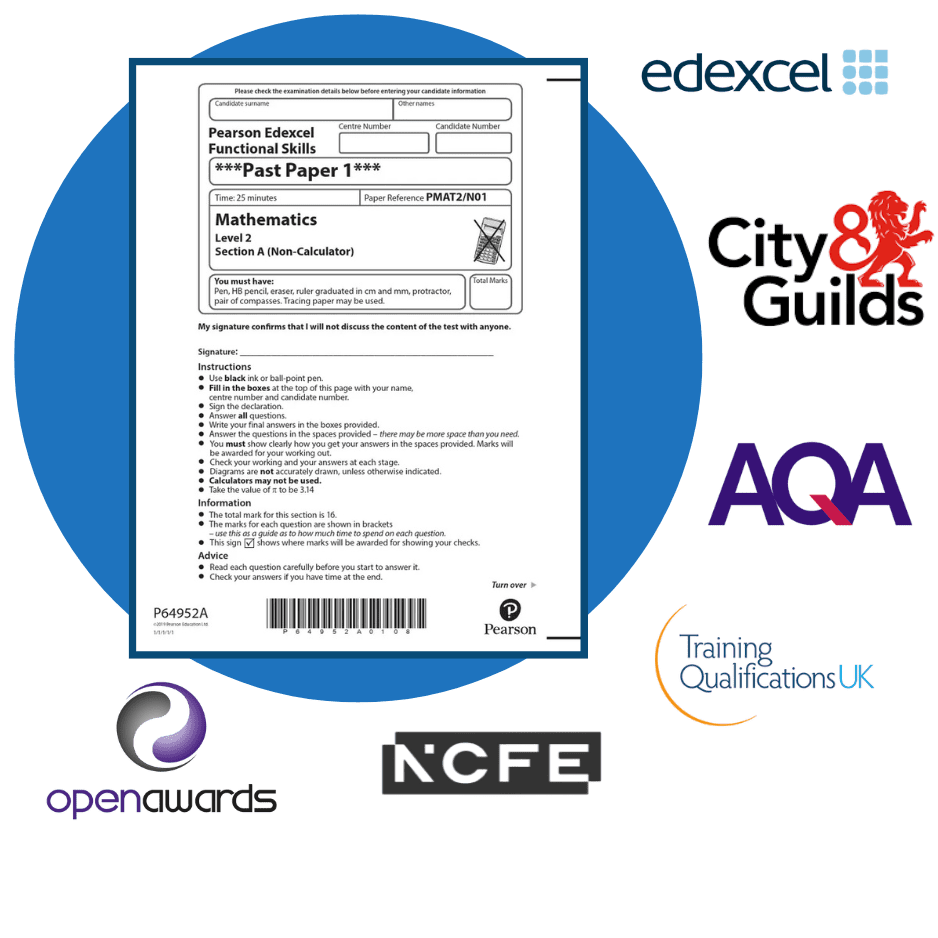Free Functional Skills Past Papers
Get exam-ready with our free Functional Skills past papers for Maths and English at Entry Level, Level 1, and Level 2. Browse by awarding body, download printable PDFs, and mark your work using the official mark schemes. Each paper mirrors real exam conditions, so you can build confidence, sharpen your timing, and spot exactly where to focus your revision.
Whether you’re aiming for progression at college, meeting an apprenticeship requirement, or boosting your employability, practising with genuine past papers is the most effective way to improve. Start with your current level, track your scores, and then move up when you’re ready.

Maths and English Functional Skills Past Papers
Why practise with past papers?
Past papers are the closest rehearsal you can get to the real assessment. They expose you to authentic question wording, the balance of topics, and the pressure of a fixed time limit. That combination trains your knowledge and your exam craft: reading questions accurately, choosing efficient methods, and presenting clear, mark-worthy answers. Over a handful of papers, you’ll turn theory into a dependable routine you can reproduce on the day.
Get exam-ready faster
Past papers compress the learning curve. Instead of revising “everything”, you practise exactly the skills that appear in real assessments – interpreting tasks, selecting methods, and setting out steps clearly. You’ll also build a mental library of common question frames (e.g., multi-step word problems, data interpretation, practical writing prompts). Recognising these patterns speeds up your planning and reduces second-guessing. As you review each script, you’ll spot precise habits to adopt – like underlining key details, estimating before you calculate, or drafting a quick plan for longer writing tasks.
Master your timing
Working under authentic time limits teaches you how long typical tasks should take and when to move on. You’ll learn to:
- Allocate time per section (e.g., quick wins first, heavier marks later).
- Use micro-deadlines (finish Q1–Q5 by 20 minutes) to stay on pace.
- Park and return to sticky questions without stress.
Over several attempts, you’ll see both speed and accuracy improve, not just one at the expense of the other.
Find (and fix) weak spots
Past papers turn vague weaknesses into actionable targets. Keep a simple error log with four columns: topic, question type, cause, fix. Was the issue missing knowledge, misreading, method selection, or sloppy arithmetic/spelling? Link each cause to a specific remedy: a page to re-read, a method to practise, or a checklist to apply. Revisit the same question style within a week to confirm it’s truly fixed.
Learn how marks are awarded
Mark schemes aren’t just for scoring – they’re a training manual. Compare your answers to see where marks were available and why they were lost. Look for phrases like “method shown”, “correct units”, or “evidence of planning”. Build mini-checklists from these patterns:
- Maths: show operations, label units, round only at the end, state assumptions.
- English: address purpose and audience, organise logically, check spelling/grammar, support points with evidence.
Practising with these checklists makes your responses “examiner-friendly” and stops easy marks slipping away.
Build confidence & reduce nerves
Familiarity lowers anxiety. After a few full papers, the format feels routine, and your attention shifts from worrying to performing. Confidence comes from evidence: timing splits you can hit, question types you’ve solved before, and a strategy you’ve rehearsed. Go into the exam knowing you’ve already done something very similar – several times.
Track real progress
Scores from past papers give you an honest read on readiness. Plot your results and timing across attempts to spot trends. Aim for steady, repeatable performance rather than a one-off high score. If a result dips, your error log will show why – and what to change next session.
